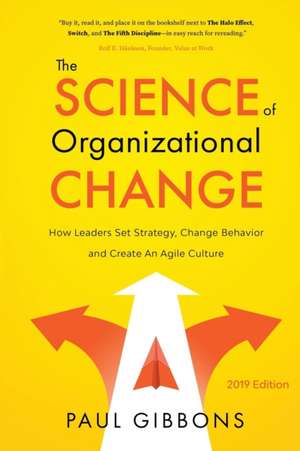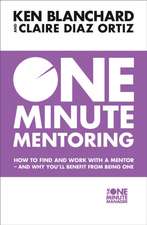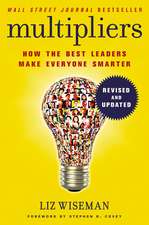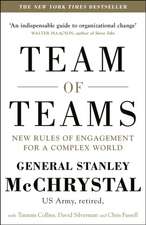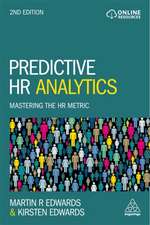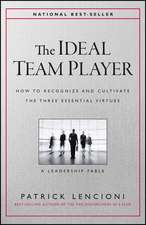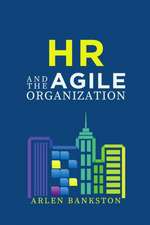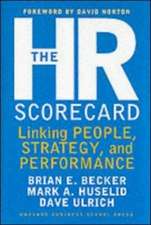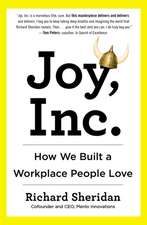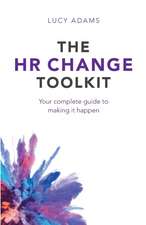The Science of Organizational Change
Autor Paul Gibbonsen Limba Engleză Paperback – 20 mai 2019
"The best book on change in fifteen years, perhaps longer..." (Organization Development consultant)
Leaders need guidance on leading change grounded in the latest science, not 20th-century myths. In this updated 2019 edition of The Science of Organizational Change, Paul takes us on a journey from change mythology, from New Age change ideas, from "reports in drawers", and from pop psychology up to the present.
In the first comprehensive treatment of behavioral science in business, you'll learn which cognitive biases caused the 2008 Financial Crisis, Enron, and the Deepwater Horizon. Later in the book, you'll discover how evidence-based management is helping leading businesses including Google.
The author's 30-year career, scholarly approach, but without dry academic writing make this book a must-read for all managers interested in change. Few authors incorporate findings from psychology, sociology, medicine, philosophy of science, ethics, public policy, economics, and mathematics into books on change. Fewer still do it in an interesting way.
Read case studies from Cisco, Intel, Nokia, BP, Shell, Barclays, British Airways, Comcast, and PwC - all former clients of the author where he advised at C-suite level.
Preț: 145.54 lei
Nou
27.85€ • 28.97$ • 22.99£
Carte disponibilă
Livrare economică 24 martie-07 aprilie
Specificații
ISBN-10: 0997651237
Pagini: 448
Dimensiuni: 153 x 226 x 27 mm
Greutate: 0.59 kg
Editura: Touchladybirdlucky Studios
Descriere
Leaders need guidance on change grounded in the latest science, not 20th-century myths. In this updated 2019 edition of The Science of Organizational Change, Paul Gibbons takes us on a journey from change mythology, from New Age change ideas, from "reports in drawers", and from pop psychology up to the present.In the first comprehensive treatment of behavioral science in business, you'll learn which cognitive biases caused the 2008 Financial Crisis, Enron, and the Deepwater Horizon. Later in the book, you'll discover how evidence-based management is helping leading businesses including Google.There are new concepts such as change-agility that answer the question - "how can organizations be more responsive, so they are the disruptors, rather than the disruptees?" Turbulent environments demand constant change, but the mindset, skills, and behaviors taught to business leaders are unhelpful and sometimes flatly misleading.In The Science of Organizational Change, Paul Gibbons offers the first blueprint for change for that fully reflects the newest advances in mindfulness, behavioral economics, sociology, and complexity theory.The Science of Organizational Change first identifies dozens of change management myths, bad models, and unhelpful metaphors, replacing some with twenty-first-century research. Paul Gibbons links the origins of theories about change to the history of ideas and suggests that the human sciences will provide real breakthroughs in our understanding of people in the twenty-first century. For example, change fundamentally entails risk, yet little is written for business people about how breakthroughs in the psychology of risk can help change leaders. Change fundamentally involves changing people's minds, yet the most recent research shows that the provision of facts may strengthen resistance. Starting with a rigorous and evidence-based understanding of what makes people in organizations tick, he presents a complete framework for organizing your company around successful change. With case studies from Google, IBM, Shell, British Airways, British Petroleum, HSBC, and Morgan Stanley, Gibbons goes deeper and broader than any previous discussion of the subject.In this multi-disciplinary treatment of change leadership, you will learn: How a deeper understanding of flaws in human decision-making can help you make far better choices when the stakes are largest.How new advances in neuroscience have altered best practices in influencing colleagues, negotiating with partners, engaging followers' hearts, minds, and behaviors, and managing resistance.How to bring greater meaning and mindfulness to your organization - and reap their benefits.How new ideas from analytics, forecasting, and risk are humbling those who thought they knew the future - and how the human side of analytics and the psychology of risk are paradoxically more important in this technologically enabled world.How to improve your boardroom, promoting more effective conversations about strategy, ethics, and decision-making.What chaos and complexity theories mean in the context of your own business.How to create resilient and agile business cultures, and anti-fragile, dynamic business structures.To link science with your "on-the-ground" reality, Gibbons interviews top CEOs who are applying its principles. You'll find case studies from well-known companies like IBM and Shell; and deeply relevant quotations from history's greatest leaders and thinkers.Hailed as "the best book on change in 15 years" and a book that belongs alongside classics such as The Halo Effect, Switch, and the Fifth Discipline - The Science of Organizational Change is a must-read for senior executives and change experts alike.
Notă biografică
business and academia. His research and writing explore how philosophy and science can be used to enlighten contemporary business thinking, debunk myths and pseudoscience, and solve practical business
problems, including changing culture, developing leaders, and
using analytics and evidence to make strategic decisions. Paul's academic background, starting in math, then in economics, neuroscience, psychology, and philosophy, allows him to bring perspectives to business not typically found in traditional business books.
His consulting career, mostly in Europe, included founding an award-winning "teal" Organization Development consulting firm, Future Considerations. Paul has coached dozens of CEOs - on strategy, change, and talent issues. His change experience includes clients such as Comcast, Shell, PwC, BP, Barclays, KPMG, British Airways, HSBC, Nokia, The Body Shop, Comcast, the NHS, and UK Ministers. He was the
change management lead on a $1 billion program for the
UK's Department of Work and Pensions.
Paul has appeared in Microsoft's Distinguished Author Program and at Google and appeared in the Wall Street Journal and the Financial Times. He is a Fellow of the Royal Society of Arts.
He now writes, hosts the award-winning Think Bigger Think Better philosophy podcast, plays competitive poker, chess, and bridge, and raises two boys in Colorado.
